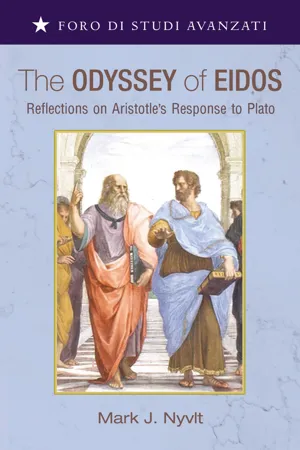
- 186 pages
- English
- ePUB (mobile friendly)
- Available on iOS & Android
About this book
Aristotle sets the horizons of our inquiry: What is it when we say we know something? And is the object of knowledge a universal or particular [tode ti] object? Aristotle's critique of Plato's theory of form/Forms in light of his notion of actuality has generated a variety of topics that frame our inquiry: "Understanding Eidos as Form in the Works of Aristotle as Plato's Critical Student"; "Aristotle on Plato's Forms as Causes"; "Notes on the Relationship between Plato's Parmenides and Aristotle's Metaphysics Alpha"; "'Separate' and 'Inactive'? Aristotle's Most Challenging Critique of Plato's 'Forms'"; "Too Much Unity in a City Is Destructive of the City: Aristotle against Plato's Unification Project of the Polis"; "Aristotle on the Soul as Actuality"; "Delphic Piety in the De Anima of Alexander of Aphrodisias"; "Aristotle and Plotinus: Act and Potency and the Two Acts"; and "Al-F?r?b?on Habit and Imagination." Here, the Peripatetic readings of form and actuality are parsed from the precipice of historical, analytic, and continental approaches to the mind/language/object problem, with advocacy of the importance of Aristotle's contribution to this inquiry for the present age.
Frequently asked questions
- Essential is ideal for learners and professionals who enjoy exploring a wide range of subjects. Access the Essential Library with 800,000+ trusted titles and best-sellers across business, personal growth, and the humanities. Includes unlimited reading time and Standard Read Aloud voice.
- Complete: Perfect for advanced learners and researchers needing full, unrestricted access. Unlock 1.4M+ books across hundreds of subjects, including academic and specialized titles. The Complete Plan also includes advanced features like Premium Read Aloud and Research Assistant.
Please note we cannot support devices running on iOS 13 and Android 7 or earlier. Learn more about using the app.
Information
Table of contents
- Title Page
- Preface
- Acknowledgments
- Introduction
- Chapter 1: Understanding Eidos as Form in the Works of Aristotle as Plato’s Critical Student1
- Chapter 2: Aristotle on Plato’s Forms as Causes
- Chapter 3: Notes on the Relationship between Plato’s Parmenides and Aristotle’s Metaphysics Alpha
- Chapter 4: ‘Separate’ and ‘Inactive’?
- Chapter 5: Too Much Unity in a City Is Destructive of the City
- Chapter 6: Aristotle on the Soul as First Actuality
- Chapter 7: Delphic Piety in the De Anima of Alexander of Aphrodisias
- Chapter 8: Plotinus’ Reconfiguration of Aristotle’s Act and Potency into the Principle of Two Acts
- Chapter 9: Al-Fārābī on Habit and Imagination